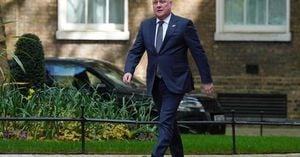The aftermath of the tragic mass shooting at Annunciation Catholic School in Minneapolis on August 27, 2025, has reignited a fierce national debate over the role of prayer, faith, and legislative action in the face of recurring gun violence. Two children, aged 8 and 12, lost their lives and several others were injured when a lone shooter, armed with guns obtained legally and marked with anti-Trump and antisemitic inscriptions, opened fire during a mass at the Catholic school. The horror of the event has once again forced Americans to confront uncomfortable questions about what comes next after the condolences are offered and the candles are lit.
In the immediate aftermath, the familiar refrain of offering “thoughts and prayers” quickly became a flashpoint in the national conversation. Former White House Press Secretary Jen Psaki, now an MSNBC host, took to social media the following day to express her frustration. “Prayers does not end school shootings,” Psaki wrote, adding, “prayers do not make parents feel safe sending their kids to school. Prayer does not bring these kids back. Enough with the thoughts and prayers.” Her remarks echoed a sentiment that has grown louder in recent years, particularly among Democrats and gun control advocates, who argue that expressions of sympathy without accompanying legislative action have become an empty ritual in the face of unending tragedy.
Minneapolis Mayor Jacob Frey, visibly shaken in his public remarks on August 27, underscored the raw emotion of the moment. “Don’t just say this is about thoughts and prayers right now, these kids were literally praying,” he said, highlighting the heartbreaking irony that children killed in the shooting were engaged in prayer at the time of the attack. Frey’s comments resonated with many who feel that the language of condolence has become insufficient in the face of repeated violence.
Yet, the backlash to Psaki’s comments and those like them was swift and impassioned. Vice President Vance responded on X (formerly Twitter), defending the importance of prayer in times of crisis. “We pray because our hearts are broken. We pray because we know God listens. We pray because we know that God works in mysterious ways and can inspire us to further action,” he wrote, pushing back against what he saw as attacks on faith itself. White House Press Secretary Karoline Leavitt, speaking from the White House podium on August 29, went further, calling Psaki’s remarks “incredibly insensitive and disrespectful to the tens of millions of Americans of faith across this country who believe in the power of prayer, who believe that prayer works.”
The story didn’t end with the usual partisan sniping. Fox News, as expected, ran multiple segments critiquing Psaki’s stance, but the debate spilled over into broader political circles. House Speaker Mike Johnson (R-La.) weighed in during a Fox appearance on August 30, stating, “It’s incredible to me that Jen Psaki, Gavin Newsom and others would attack religion, diminish the faith of millions of Americans at a time of such great tragedy. There are a lot of common-sense things that can be done to protect children at school. This is not a time to politicize these issues.”
But for many, the core issue remains unchanged: the persistent lack of significant legislative action to prevent future shootings. The frustration over “thoughts and prayers” is, in many ways, a stand-in for broader exasperation with a government that has repeatedly failed to pass meaningful gun control measures—even after high-profile tragedies like the Sandy Hook Elementary School shooting in 2012, which killed 20 children. According to police, the Minneapolis shooter had obtained his firearms lawfully, a detail that has only fueled calls for reform.
On August 30, the conversation took a sharper theological turn on MSNBC when Tennessee State Representative Justin Jones, himself a minister, called the ritual of post-shooting prayers “a form of theological malpractice” and “idolatry.” Jones argued, “When you pray for something that you have the power to change—there’s an African proverb that says, when you pray, you move your hands and feet. You know, what we’re seeing is a form of idolatry, where we’re willing to worship the lives of our children to appease the prophets of the gun industry.” He further criticized Republican lawmakers for passing legislation to shield gun manufacturers from litigation after the Covenant School shooting in Tennessee, rather than enacting measures to curb gun violence. “It is cruel, it is shameful, it’s immoral, and it is something that is going to be a dark stain on American history, that we’ve allowed this to go on for so long unchallenged. And we have the power to change things,” Jones said.
Jones’s comments struck a chord with those who see prayer as a call to action, not a substitute for it. He continued, “If you wanna address gun violence, you don’t need a tweet, what you need is a mirror. You have the power to change things. You have the power to take action. Now is the time, until it’s your child, because sooner or later it’s gonna hit home. And then it’ll be too late.”
Others in the faith community have offered a more nuanced view. Joe Ferullo, CEO and publisher of the National Catholic Reporter, lamented the way faith is deployed in political discourse. “To me this is the saddest example I’ve ever seen of how faith is used and abused in our political discourse. Everybody understands that praying helps and focuses us on how to move forward. But praying is not enough.”
Michael Emerson, a religion and politics expert at Rice University’s Baker Institute for Public Policy, explained the divide: “Prayer in almost every religion is at the core of one’s faith. The challenge then is do you let the divine handle whatever the issue at hand is or are you also supposed to be the hands and feet, like we hear. When you see someone hungry on the street, do you say, ‘I pray for you,’ or do you say ‘I pray for you’ and give them something to eat? It’s the same issue here.”
Democratic strategists have been candid about their approach. “On this, Republicans are trying to own the space of faith just like they do patriotism,” one told The Hill this week. “Scripture says faith without works is dead. The difference between us and them is we follow our thoughts and prayers up with action and they do not.” Meanwhile, Republican strategists see the Democratic critique as a political gambit. “Democrats are losing on so many fronts right now, but this is something they feel like they can win on heading into the midterms. Everyone knows lawmakers aren’t going to take much action legislatively and that’s what they’re trying to highlight in a way, but I’m not sure attacking prayer is the smartest way to go about it.”
The debate is hardly new. Former President Obama, after a 2015 mass shooting at an Oregon community college, famously said, “Our thoughts and prayers are not enough. It does not capture the heartache and grief and anger that we should feel. And it does nothing to prevent this carnage from being inflicted someplace else in America.”
As Americans mourn the loss of two more children and brace themselves for the next inevitable tragedy, the question remains: will the country move beyond thoughts and prayers, or will the cycle of grief and inaction continue?




